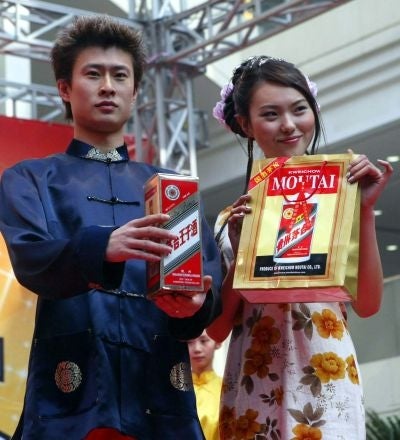It has long been a rite of passages for first-time visitors - and an experience that they won't soon forget.
A toast of the fiery liquor Maotai (also spelled Moutai) has traditionally been the way to bring an end to an auspicious dinner or meeting in China and now the maker of the potent brew wants to take its product to the world.
Kweichow Moutai Distillery ( http://www.moutaichina.com/en/index.asp) - sole maker of Maotai - has announced a deal with the French distributor Camus Cognac which will see its product sold in more than 140 countries and served on more than 50 airlines across the world over the next year or so.
Just how the international market will take to Maotai is anyone's guess but judging by the look on former US president Richard Nixon's face when he took a sip during his historic visit in 1972, the taste may take some getting used to.
Maotai - known as China's "national liquor" - is only made in the southwestern province of Guizhou where one distillery controls the annual output of around 25,000 tonnes. Up until now, around 95 percent of liquor has been sold in mainland China where, due to that limited supply, prices have risen by 20 percent in recent years.
A bottle of the liquid now costs around 1,500 yuan (160 euros) in China, while the bottles that have found their way overseas can be picked up for just 640 yuan (68 euros).
The drink is a heady brew distilled from the fermented sorghum plant. It has its origins in the Qing Dynasty (1644 to 1912) and even Chairman Mao Zedong is said to have taken a fancy to the stuff while he was leading his army against Nationalist forces in the 1930s.
The move to take a Chinese liquor overseas is a change in tact in a country which has in recent years seen the tastes of its ever growing middle class turn to wine, especially French vintages. The wine industry in China was negligible as recently as a decade ago but last year imports to the country were worth more than 600 million euros.
Regardless of the taste - or the effects - of Maotai, those involved in the new plan are bullish about its prospects.
"There's nothing equivalent to the romantic and fragrant taste of Maotai," Cyril Camus told Hong Kong's South China Morning Post. " It's not a matter of whether it will succeed internationally. It's just a matter of when."
MS
Subscribe to Independent Premium to bookmark this article
Want to bookmark your favourite articles and stories to read or reference later? Start your Independent Premium subscription today.


Join our commenting forum
Join thought-provoking conversations, follow other Independent readers and see their replies